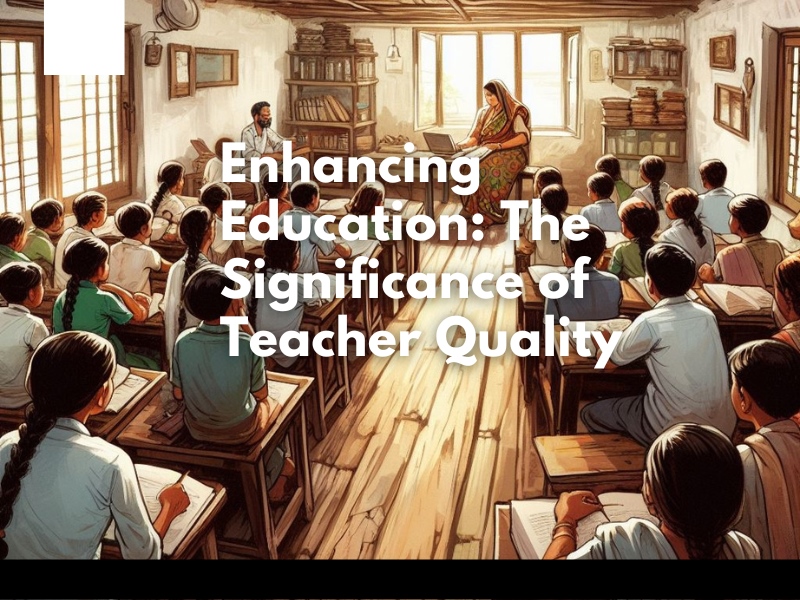In the realm of education, the quality of teachers is an irreplaceable cornerstone. The competence of educators has a direct impact on the growth and progress of students, ultimately moulding the destiny of nations. The impact of a truly exceptional teacher extends far beyond the classroom, instilling knowledge, values, and aspirations in their students. In this blog post, we delve into why teacher quality matters, uncovering the profound impact of dedicated educators on the lives of learners and society as a whole. Additionally, we delve into groundbreaking approaches aimed at enriching teacher quality. Our particular emphasis is on a revolutionary method that’s been reshaping both communities and educational institutions, paving the way for a more promising and equitable future driven by the force of education.
Why Teacher Quality Matters
Quality teachers are more than just instructors; they are mentors, inspirations, and lifelong influencers. Their impact extends far beyond the classroom. When students have the privilege of being under the tutelage of proficient and committed teachers, their academic accomplishments, interpersonal abilities, and general welfare typically thrive. Quality teachers instil a love for learning, boost confidence, and ignite a passion for knowledge. Their impact resonates across generations, moulding upcoming leaders, intellectuals, and individuals skilled in solving problems. Therefore, fostering the best quality teachers should be a priority for any community that aspires to empower its youth and build a brighter, more prosperous future.
Characteristics of Quality Teachers
What sets a best-quality teacher apart? It combines various traits, including exceptional subject knowledge, effective communication skills, patience, adaptability, and a genuine passion for teaching. Quality teachers are not just experts in their field; they have the ability to simplify complex concepts, making learning accessible and engaging for students. Patience is a virtue they embody, understanding that each student progresses at their own pace. Adaptability is critical in today’s diverse classrooms, where every student brings a unique set of needs and challenges. However, perhaps the most remarkable trait of quality teachers is their capacity to form meaningful connections with their students. They create a safe and nurturing space where questions are encouraged, mistakes are seen as opportunities to learn, and curiosity is celebrated. These characteristics collectively profoundly impact student’s lives and the education system as a whole.
Improving Teacher Quality
The question of how to enhance teacher quality is a crucial one in this industry. While traditional teacher training methods have long played a crucial role, innovative approaches are now gaining prominence. One such approach involves developing teachers from within the community. This method recognizes that individuals within a community often have a deep understanding of local needs and challenges. By empowering community members to become educators, schools can benefit from instructors who are intimately familiar with the unique circumstances of their students. This approach not only brings fresh perspectives into the education system but also fosters a sense of ownership and pride within the community. As a result, students receive an education that is not only academically sound but also culturally relevant and community-oriented, ultimately contributing to improved teacher quality and better educational outcomes.
Community-Developed Teachers
In numerous regions, community-developed teachers are emerging as the driving force behind educational reform. These educators hail from the very communities they serve, offering an intimate understanding of the specific challenges and needs their students face. This firsthand experience grants them a unique ability to relate to their pupils, bridging the gap between the classroom and the real world.
What sets community-developed teachers apart is their profound dedication to their roles. Many of them commit their careers to the betterment of their own communities. Their passion for ensuring the success of every child is palpable, often inspiring students to reach their full potential. These educators serve as not only instructors but also as guides, exemplars, and champions for a more promising tomorrow, playing a pivotal role in enhancing teacher quality and moulding the upcoming generation of students.
The Positive Impact
The impact of teachers developed within the community extends widely and profoundly. They serve as vital bridges between educational institutions and the community at large, building trust and fostering active engagement. Students, especially those facing socio-economic challenges, often view these teachers as inspiring role models who have surmounted similar obstacles to attain academic success. This motivational factor is instrumental in encouraging students to set ambitious goals and work diligently towards achieving them.
Furthermore, community-developed teachers possess a unique ability to tailor their teaching methods to align with the cultural context of their communities. This cultural sensitivity not only makes education more relatable and engaging but also transforms schools into vibrant community hubs. In this role, they help fortify social bonds and promote holistic development beyond academic achievements, underlining their pivotal role in elevating teacher quality and positively influencing the growth and development of students and communities alike.
Continuous Professional Development
Dedicated to their craft, quality teachers understand that learning is a lifelong endeavour. They actively participate in continuous professional development opportunities, which can encompass a range of activities like attending workshops, pursuing advanced degrees, or collaborating with peers. These encounters act as potent instruments for instructors to hone their expertise, broaden their reservoir of knowledge, and stay updated with the ever-evolving educational strategies and approaches. The results of this dedication are significant: educators who participate in ongoing professional growth are more adept at delivering top-notch education and efficiently adapting to the evolving requirements of their students. It’s a testament to the relentless commitment of educators who aspire to not only achieve competence but to consistently excel in their crucial capacity as mentors and compasses in their students’ educational odyssey.
Teacher-Student Relationships
Quality teachers understand that education isn’t solely about imparting knowledge; it’s also about fostering meaningful relationships. They invest time and effort into building strong teacher-student bonds that extend beyond the classroom. These connections are founded on trust, open communication, and a genuine concern for students’ well-being. Quality educators make it a point to know their students as individuals, recognizing their strengths, weaknesses, and unique learning styles. This personalized approach creates a positive and supportive learning environment where students feel valued and motivated. It also enables teachers to tailor their teaching methods to suit the needs of each student, ultimately enhancing the overall educational experience. These relationships extend far beyond the school years, leaving a lasting impact on student’s lives and shaping them into well-rounded individuals prepared for the challenges of the future.
Assessment and Feedback
Quality teachers understand that assessment is not merely about evaluating students’ performance; it’s a dynamic process aimed at fostering growth. They utilize various assessment tools, from quizzes and exams to projects and presentations, to gauge students’ understanding and progress. Importantly, these educators provide timely, constructive feedback that goes beyond grades. Their feedback is specific, highlighting strengths and areas for improvement, and it often includes guidance on how to enhance performance. This approach empowers students to take an active role in their learning journey, as they gain insights into their own development. Furthermore, quality teachers use assessment data to adapt their teaching methods, ensuring that instruction is responsive to individual learning needs. This dedication to effective assessment and feedback not only enhances students’ academic performance but also equips them with essential skills for lifelong learning and self-improvement.
Inclusivity and Diversity
Quality teachers understand that diversity is a strength, not a challenge. They recognize that each student is unique, bringing their own background, experiences, and learning styles to the classroom. To ensure inclusivity, these educators employ a variety of teaching strategies that cater to diverse needs. They may use differentiated instruction, group work, or personalized learning approaches to accommodate various learning styles and abilities. Furthermore, exceptional educators cultivate a classroom atmosphere in which students feel secure in voicing their thoughts, seeking clarification, and contributing their viewpoints. By celebrating diversity and promoting inclusivity, they create a rich learning experience that not only supports academic growth but also nurtures empathy, understanding, and respect among students. In this inclusive space, every student has the opportunity to thrive and reach their full potential.
Conclusion
Teacher quality lies at the core of a thriving education system. The influence of dedicated, skilled educators extends far beyond the classroom, leaving an indelible mark on the future of society. Whether through conventional training or innovative approaches like community development, nurturing quality teachers is an investment in the well-being and progress of nations. The characteristics of best-quality teachers, such as subject knowledge, effective communication, and a commitment to continuous improvement, are the pillars of educational success. By acknowledging the importance of teacher-student relationships, welcoming diversity and inclusivity, and advocating for ongoing professional development, we can raise the standard of teacher quality to unprecedented levels. As we look to the future, let us remain steadfast in our commitment to supporting and empowering teachers, for they are the architects of the world’s next generation.

